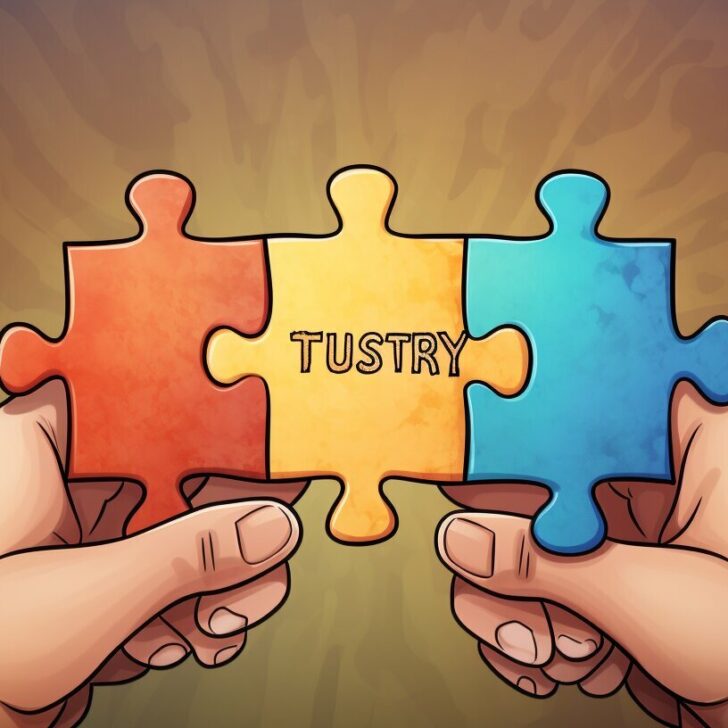What are the 5 elements of trust? Trust is a vital component of building strong relationships, whether in personal or professional settings.
Trustworthiness is something that everyone desires, and it is essential to learn the five elements that contribute to it.
By understanding how to build trust, you can work towards fostering great trust with those around you.
Key Takeaways:
- Trust is essential in building strong relationships.
- These five elements or trust factors contribute to trustworthiness: reliability, honesty, good will, competency, and openness.
- By consistently demonstrating these trust building qualities, you can foster deeper relationships and build a foundation of trust
Reliability: Being Reliable Creates Trust
The first of the 5 elements of trust is reliability. When you consistently deliver on your promises and are dependable, others are more likely to trust you. Whether it’s in your personal or professional life, being reliable is crucial for fostering strong relationships.
Think about a time when someone let you down by not following through on something they said they would do. It likely caused you to doubt their trustworthiness and made it harder for you to rely on them in the future. On the other hand, when someone consistently shows up and does what they say they will do, you feel confident in their abilities and trust them more.
In a professional setting, reliability is especially important. Your colleagues and clients need to know that they can count on you to meet deadlines, complete tasks, and fulfill obligations. When you consistently demonstrate your reliability, you build a reputation for dependability and trustworthiness.
Honesty: Telling the Truth Creates Trust
The second element of the 5 elements of trust is honesty. In today’s world, where dishonesty and deception often seem to be the norm, truthful acting in good faith is a highly valued trait that stands out. When it comes to establishing trust, being honest and transparent is crucial. Trustworthiness is often associated with honesty and integrity, which are essential for fostering open communication and establishing credibility.
Telling the truth creates trust because it means you are attracted to truth and avoiding misleading or deceptive practices. The more honest you are, the more confident others will be in you, and the more trust you will earn. People tend to trust those who are transparent and truthful in their approach to communication and interaction.
To be trustworthy, you must maintain a reputation for honesty and integrity. This involves taking responsibility for your actions, admitting your mistakes, and being truthful even when it is uncomfortable. When you are known for your reliability, honesty, and transparency, people will be more likely to trust you with important tasks and information.
To build trust, you need to be consistent in your actions and communication. Honest communication that is consistent with your behavior is key. Trust is often eroded when there is a mismatch between what someone says and what they do. So, being honest and following through on your commitments is essential for maintaining trust over the long term.
Incorporating honesty and transparency into your daily interactions can be challenging, but it is essential for building trust in personal and professional relationships. The more trustworthy you are, the more you can expect others to trust you, and the stronger your relationships will become.
Good Will: Acting in good faith creates trust
In addition to reliability, honesty, and competency, the third element of trust is good will. Acting in good faith, showing genuine care, and having positive intentions are all essential trustworthiness factors when it comes to building trust in relationships.
Acting in good faith creates trust. When you act in good faith, you demonstrate that you have the best interests of others in mind. This can be particularly important in professional relationships, where the stakes may be high and decisions can have significant consequences. By acting in good faith, you signal to others that you are trustworthy and dependable.
Goodwill can also play an important role in personal relationships. Whether you’re building a friendship, a romantic relationship, or a family bond, acting in good faith and showing genuine care can help to foster deeper connections and build trust over time.
To build trust through goodwill, it’s important to be mindful of your actions and intentions. Ask yourself whether you’re truly acting in good faith, or whether you might be motivated by self-interest or personal gain. If you’re not sure, seek feedback from others who know you well and can offer an honest perspective.
Ultimately, building trust through goodwill requires a commitment to acting with integrity and putting the needs of others first. By doing so, you can establish yourself as a trustworthy and reliable partner in any relationship.
Competency: Doing your job well creates trust
The fourth element of trust is competency. Doing your job well creates trust. In any professional environment, demonstrating competence is crucial in building and maintaining trust. When you show that you have the skills and knowledge necessary to perform your job well, it instills confidence in your colleagues and superiors. People trust those who are competent because they feel assured that their work is in good hands.
Being competent doesn’t just mean having the technical skills to perform a certain task. It also involves being able to manage your workload efficiently, meet deadlines consistently, and take initiative when necessary. When you demonstrate these qualities, you create a sense of reliability and dependability that builds trust.
Furthermore, being reliable creates trust because it means you are adaptable and open to learning. When you are willing to learn new skills (technical or leadership) and take on new challenges, you show that you are committed to self-improvement and growth. This, in turn, fosters trust because it demonstrates a willingness to evolve with the needs of the organization.
Openness: Being Vulnerable Creates Trust
The final element of is openness. Being vulnerable creates trust. This means being willing to share personal thoughts and emotions, as well as being receptive to feedback. When you are open to vulnerability and feedback, you demonstrate that you are genuine and willing to learn from your mistakes. This can deepen relationships and help build trust.
It’s not always easy to be vulnerable, but it’s an essential element of trust-building. When you share your thoughts and feelings with others, you create an opportunity for them to connect with you on a deeper level. This can lead to a greater understanding of one another and can foster mutual respect.
Being open and vulnerable also means being willing to receive feedback from others. When you allow others to give you feedback, you demonstrate that you value their opinion and are open to growth and improvement. This can help strengthen relationships and build trust with those around you.
Keep in mind that being open and vulnerable doesn’t mean sharing everything with everyone. It’s important to use your judgement to determine what is appropriate to share with different individuals and in different situations.
Overall, being open to vulnerability and feedback is an important element of building trust in relationships. By demonstrating your willingness to share and learn from others, you can deepen your connections and build stronger, more trusting relationships.
Conclusion
Building trust in relationships is key to establishing strong connections that last. The five elements of trust are reliability, honesty, goodwill, competency, and openness. They’re essential in creating an environment of mutual trust and respect. By consistently demonstrating these qualities, you can foster deeper relationships and build a foundation of trust that will endure over time.
Reflect on these elements in your personal and professional interactions. Consider how you can apply them to your daily interactions to build stronger and more meaningful relationships.
Remember, building trust takes time and effort, but the rewards are immeasurable. By prioritizing trustworthiness and demonstrating the five elements of trust, you can create deeper, more authentic connections and establish yourself as a reliable, trustworthy partner in all your relationships.
FAQ For What Are The 5 Elements of Trust?
Q: What are the five elements of trust?
A: The five elements of trust are reliability, honesty, good will, competency, and openness.
Q: How does reliability create trust?
A: Reliability creates trust by consistently delivering on promises and being dependable.
Q: Why is honesty important in building trust?
A: Honesty is important in building trust because telling the truth and being transparent fosters open communication and credibility.
Q: What role does good will play in trustworthiness?
A: Good will contributes to trustworthiness by acting in good faith, showing genuine care, and having positive intentions.
Q: How does competency build trust?
A: Competency builds trust by demonstrating skills and knowledge, instilling confidence and trust in others.
Q: Why is openness crucial in creating trust?
A: Openness creates trust by being vulnerable, receptive to feedback, and willing to share personal thoughts and emotions, promoting understanding and deepening relationships.

